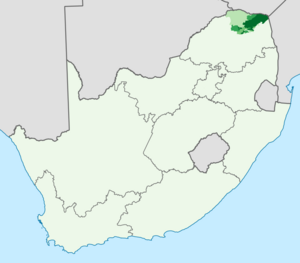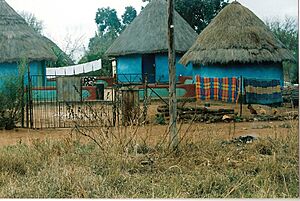Venda people facts for kids
 |
|
| Total population | |
|---|---|
| ~2.5 million | |
| Regions with significant populations | |
| Languages | |
| Tshi-Venda | |
| Religion | |
| Christianity, Traditional African religion | |
| Related ethnic groups | |
| Makua people, Shona people, Sotho-Tswana peoples, and Kalanga people |
| Venda | |
|---|---|
| Person | MuVenda |
| People | VhaVenda |
| Language | TshiVenda/Lu-venda |
| Country | Venda |
The Venda people (also called VhaVenda or Vhangona) are a group of people from Southern Africa. They mostly live near the border between South Africa and Zimbabwe. Their language, TshiVenda, developed around the 1400s in Zimbabwe. It was influenced by the Sotho-Tswana and Kalanga languages.
The Venda people have a long history. It goes back to the Kingdom of Mapungubwe, which started in the 800s. King Shiriyadenga was the first king of this kingdom. The Mapungubwe Kingdom was very large. It stretched from the Soutpansberg mountains in the south to the Matopos hills in the north. This kingdom became less powerful around 1240. Power then moved north to the Great Zimbabwe Kingdom. The first Venda settlement in the Soutpansberg area was led by Chief Thoho-ya-Ndou. His royal home was called D’zata. Its old remains are now a National Monument. The Mapungubwe Museum in Pretoria has many old items found at the Mapungubwe site. Venda people share ancestors with the Lobedu people and Kalanga people. They are also related to Sotho-Tswana and Shona groups. All these groups were once part of the Venda kingdom.
Contents
Venda History and Origins
The Venda people today are made up of different groups. These include the Vhangona, Takalani (Ungani), and Masingo. The Vhangona are the first people who lived in the Venda area. They are also known as Vhongwani wapo. The Masingo and other groups came from central Africa. They moved across the Limpopo river during the Bantu expansion. Like other South African tribes, the Venda people originally came from central and east Africa.
Venda Family Groups (Clans)
Today's Venda people come from many different family groups, called clans. Some of these clans are:
- Dzindou dza Hakhomunala Mutangwe / Dzatshamanyatsha
- Dzindou Dza Manenzhe
- Vhafamadi
- Vhadau vhatshiheni
- Vhadau Madamani
- Rambuda
- Vha Ha-Ramavhulela (from Dzimauli)
- Vhakwevho
- Vha Ha-Maďavha (from Zimbabwe)
- Vhambedzi
- Vhania
- Vhagoni
- Vhalea
- Gebebe
- Ndou
- Maďou
- Vhasekwa
- Vhaluvhu
- Vhatavhatsindi
- Vhalovhedzi
- VhaMese
- Vha Ha-Nemutudi
- Vhatwanamba
- Vhanzhelele/Vhalembethu
- VhaDzanani
- Vhanyai
- Vhalaudzi
- Masingo
- Rambau
- Runganani
- Ragwala
- Takalani (Ungani)
The Vhadau, Vhakwevho, Vhafamadi, Vhania, Vhalea, and Vhaluvhu groups were known as Vhangona. The Vhangona and Vhambedzi are thought to be the first people to live in the Venda region. Later, Karanga-Rodzvi clans from Zimbabwe settled in the Vhangona land. These included the Vhatwanamba, Vhanyai, Vhatavhatsindi, and Vhalembethu. The Masingo and Vhalaudzi groups arrived in Venda even later.
The Ancient City of Mapungubwe
Mapungubwe was once the center of a kingdom. About 5,000 people lived there. Mapungubwe was an important trading place between 1030 and 1290 AD. The people of Mapungubwe were skilled workers. They mined and melted copper, iron, and gold. They also spun cotton, made glass and pottery. They grew crops like millet and sorghum. They also raised cattle, goats, and sheep.
The people of Mapungubwe knew a lot about the stars. Astronomy was very important in their culture and daily lives. Mapungubwe was built before other famous settlements. These include Great Zimbabwe, Thulamela, and Dzata. People believe that the Mapungubwe residents moved to Great Zimbabwe. This was because Great Zimbabwe had a better climate.
Venda Royal Family
The Venda royal family was officially recognized in 2010. Toni Mphephu Ramabulana has been the acting king since 2012. In September 2016, Princess Masindi Mphephu challenged her uncle for the throne. She is the daughter of Tshimangadzi Mphephu, who was a Venda Chief from 1993 to 1997. Princess Masindi said she was not considered because she is a woman.
On December 14, 2016, she lost her case in court. The Thohoyandou High Court dismissed it. However, in May 2019, the Supreme Court of Appeal changed this decision. They said that Toni Mphephu-Ramabulana's appointment as king was not lawful. Ramabulana has appealed this ruling. As of July 2020, the case was still being decided by the Constitutional Court of South Africa.
Famous Venda People
Here are some notable Venda people who have their own Wikipedia articles:
D
- Benedict Daswa, a South African school teacher.
- Mulalo Doyoyo, a South African engineer and professor.
G
- Thomas Gumbu, a South African politician.
K
- Mmbara Hulisani Kevin, a South African politician.
L
- Mavhungu Lerule-Ramakhanya, a South African politician.
Ma-Mp
- Noria Mabasa, a Venda artist.
- E. S. Madima, a South African writer.
- Tenda Madima, a South African writer.
- Joe Mafela, a South African actor and singer.
- Makhado, a 19th-century King of the Venda people.
- Milicent Makhado, a South African actress.
- Rudzani Maphwanya, a South African Army officer.
- Tshilidzi Marwala, a South African engineer and computer scientist.
- Florence Masebe, a South African actress.
- Michael Masutha, a South African politician.
- Rendani Masutha, a South African naval officer.
- Shaun Maswanganyi, a South African athlete.
- Mark Mathabane, a South African tennis player and author.
- Eric Mathoho, a South African footballer.
- Kembo Mohadi, Vice President of Zimbabwe.
- Patrick Mphephu, the first president of the bantustan of Venda.
Mu
- Daniel Mudau, a South African footballer.
- Khuliso Mudau, a South African footballer.
- Sydney Mufamadi, a South African politician.
- Fulu Mugovhani, a South African actress.
- Mukhethwa Mukhadi, a South African singer and producer.
- Elaine Mukheli, a South African singer and songwriter.
- Colbert Mukwevho, a South African reggae singer.
- Gumani Mukwevho, a South African politician.
- Collen Mulaudzi, a South African long-distance runner.
- Mbulaeni Mulaudzi, a South African middle-distance runner.
- Rhoda Mulaudzi, a South African footballer.
- Rotshidzwa Muleka, a South African footballer.
- Luvhengo Mungomeni, a South African footballer.
- Clarence Munyai, a South African sprinter.
- Marks Munyai, a South African footballer.
- Tshifhiwa Munyai, a South African boxer.
- Azwinndini Muronga, a South African physicist.
- Shudufhadzo Musida, Miss South Africa 2020 winner.
- Faith Muthambi, a South African politician.
N
- Phathutshedzo Nange, a South African footballer.
- Phillip Ndou, a South African boxer.
- Lovemore Ndou, a South African-Australian boxer.
- Prince Neluonde, a South African lawn bowler.
- Fulufhelo Nelwamondo, a South African engineer.
- Tshilidzi Nephawe, a South African basketball player.
- Joel Netshitenzhe, a South African politician.
- Khumbudzo Ntshavheni, a South African politician.
P
- George Phadagi, a South African politician.
- Fred Phaswana, a South African businessman.
R
- Kagiso Rabada, a South African cricketer.
- Vhambelani Ramabulana, a South African politician.
- Rodney Ramagalela, a South African footballer.
- Cyril Ramaphosa, the 5th President of South Africa.
- Richard Ramudzuli, a South African Events Organizer.
- Gabriel Ramushwana, a former head of state of Venda.
- Phophi Ramathuba, a South African politician and doctor.
- Rudzani Ramudzuli, a South African footballer.
- Khume Ramulifho, a South African politician.
- Ndivhudzannyi Ralivhona, a South African musician.
- Rasta Rasivhenge, a South African rugby union referee.
- Frank Ravele, the second president of the bantustan of Venda.
- Riky Rick, a South African rapper and songwriter.
T
- Gabriel Temudzani, a South African actor.
- Dan Tshanda, a South African musician.
- Mashudu Tshifularo, a South African educator and medical specialist.
- Jacob Tshisevhe, a South African footballer.
- Mpho Tshivhase, a South African philosopher.
W
- Ernst Oswald Johannes Westphal, a Professor of African Languages.
Musangwe: Venda Bare-Knuckle Fighting
Musangwe is a traditional Venda sport. It involves bare-knuckle fist fighting. This sport was created for fun and to earn respect among friends. The Vhavenda people usually did not allow violence. But with Musangwe, you could challenge someone you felt was disrespectful. If challenged, you had to fight. If you refused, there could be consequences. These included a fine or even being disciplined by elders.
Winners of Musangwe fights often received rewards. The chief (Khosi) or headman (Vhamusanda) would decide the prize. The fights do not have a time limit. They only end when one fighter gives up. There are no medical staff to help injured fighters. Only village elders watch to make sure rules are followed. They prevent things like biting or kicking. It is important to know that betting on these fights is not allowed. Winners only gain pride for their village or family.
 | John T. Biggers |
 | Thomas Blackshear |
 | Mark Bradford |
 | Beverly Buchanan |


